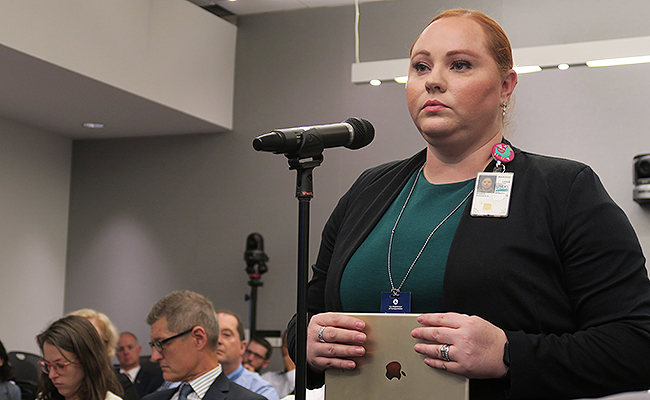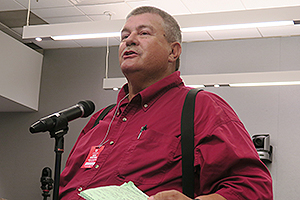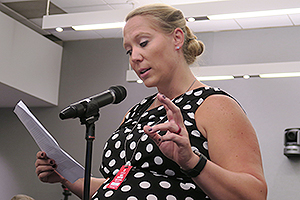Staff Reporter
Truckers Tell FMCSA of Concerns About Coercion, Flexibility at HOS Listening Session

[Stay on top of transportation news: Get TTNews in your inbox.]
WASHINGTON — Drivers and trucking industry representatives had another chance to voice comments on the Federal Motor Carrier Safety Administration’s proposal to change certain hours-of-service requirements Sept. 17.
FMCSA officials responded to participants’ concerns on the Notice of Proposed Rulemaking at a lively two-hour listening session held at the Department of Transportation’s headquarters. Many participants emphasized that the final rulemaking should include language specifying that drivers, not dispatchers, have the discretion to act on any adopted provisions.
The proposal, announced Aug. 14, would allow truck drivers more flexibility with their 30-minute rest break and with dividing their time in the sleeper berth. It also would extend by two hours the duty time for drivers encountering adverse weather and extend the shorthaul exemption by lengthening the drivers’ maximum on-duty period from 12 hours to 14 hours and increasing the distance limit in which drivers can operate from 100 air miles to 150 air miles.
Andrea Marks, a spokeswoman for Trucker Nation, cautioned that increased flexibility may open the door to coercion on the part of dispatchers. Marks urged FMCSA to make it clear that drivers, rather than shippers, should be the ones who determine if they need to pull off the road.

Trucker Nation spokeswoman Andrea Marks voiced concerns about coercion on the part of dispatchers. (Eleanor Lamb/Transport Topics)
“Drivers deserve this added layer of protection,” Marks said. “Hours of service is and will always remain a driver-centric issue.”
American Trucking Associations Vice President of Safety Policy Daniel Horvath stated that the increased flexibility suggested in the proposal is meant to benefit the driver, not the shipper.
“Flexibility does not mean giving a driver more time to drive,” Horvath said. “Flexibility is looking at the current hours-of-service and figuring out where we can put more flexibility in the hands of the driver.”
As with the first listening session FMCSA conducted on the proposal, held Aug. 23 at the Great American Trucking Show in Dallas, many participants said the agency’s openness to flexibility was a step in the right direction.

Stanton by Eleanor Lamb/Transport Topics
Bob Stanton, a representative of the group Truckers for a Cause, expressed a need for greater flexibility within the 30-minute rest-break provision, such as splitting the break into smaller segments. Truckers for a Cause represents drivers with sleep apnea. Stanton said that short breaks can lead to major health benefits, baring his lower legs to the FMCSA officials to demonstrate the negative effects of spending too much time in a sedentary position.
“Short stretch breaks are much better for solving circulatory problems,” Stanton said.

Rivera by Eleanor Lamb/Transport Topics
Allison Rivera, executive director of government affairs at the National Cattlemen’s Beef Association, supports the proposed revision that would allow drivers to split up sleeper berth time. She said dividing time in the sleeper berth can help livestock haulers use their rest periods more safely and productively. Livestock haulers must consider the needs of the animals in their trailers in addition to their own personal needs. Rivera noted these drivers encounter many weather patterns and terrains on their hauls to different feed yards.
Humidity and hot weather can be just as treacherous as blizzards for livestock haulers, Rivera said. She mentioned that livestock trailers are ventilated by perforations in the sides and roof of the trailer, meaning the animals get hot if the trailer isn’t moving.
“They key to safely hauling live animals is to stop as infrequently as possible and to keep the trailer moving,” Rivera said. “We hope the agency will continue to evaluate changes with livestock haulers in mind.”
WANT MORE NEWS? Listen to today's Daily Briefing
Safety advocates at the meeting expressed qualms about the proposal. Peter Kurdock, general counsel at Advocates for Highway and Auto Safety, said fatigue and sleep deprivation are responsible for at least 13% of truck crashes.
Eric Teoh, senior statistician at the Insurance Institute for Highway Safety, urged FMCSA to consider the safety consequences of the proposal, suggesting that it doesn’t make sense to relax rules designed to minimize fatigue.
Agency officials are seeking public comment on the proposal through Oct. 21. FMCSA extended the comment deadline by a couple of weeks to accommodate requests from ATA and the Commercial Vehicle Safety Alliance.




